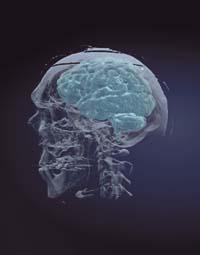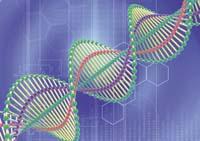What sets us apart from other animals

The footprint was obtained by comparing the genes of different species. In fact, they have compared human DNA with that of chimpanzee and macaque. In the tree of evolution, these two species and the anchor of today's man are found in the same branch (in the branch of the primates). Later they have been compared with the DNA of other species much farther from evolution, observing a great difference in the gene that encodes a certain protein. Will that be the key?
They do not know it. The protein is the same in all species (DUF1220), the gene that encodes it, but the difference lies in the number of copies of the gene: man has 212 copies, chimpanzee 37, macaque 30 and mouse and rats only one. Is it not the weak part, no? Researchers believe that this has some meaning.
Copies are not useless

In previous studies, when genetic differences were sought between species, the researchers focused on the ‘letters’ of DNA. In fact, DNA can be read as a combination of four letters. And according to the geneticists, in a given place there was one letter or another, that involved differences between people and between species. However, they are realizing that DNA also presents differences of another order and that they also have a great importance in the evolution of species.
For example, in DNA there are repeated parts. Before they did not look at him too much. It is now being observed that the number of copies of the same gene (repeatedly) varies from one species to another. And it seems that this is related to evolution.
Also in this case, the number of copies of this gene may be related to the evolution and development of intelligence. The protein that encodes the gene has been found in many parts of the body: heart, spleen, muscles and small bowel, but especially in the brain. And in the brain, not anywhere, but in the neocortex. Their neurons have intelligence related functions, so the protein has awakened the attention of the researchers.
The more, the better?

It seems that repetitions by mutation in DNA are sometimes beneficial. As for this gene, the more copies there are, the smarter the species. Or at least so we, human beings, that is, the lineages of the most advanced and intelligent species.
However, there are still many questions to be answered by scientists. Above all they want to know what their function is. They suspect it has to do with the level of intelligence, but… how to prove it? In the mouse, when they want to know what is the function of a protein, they create a transgenic mouse without gender that encodes it. They study the consequences of the lack of protein compared to the conventional mouse, as well as the functions of the protein itself. But in primates you can't do that, of course. Therefore, they must continue to try it by other means. See if this brain protein helps them!
Published in 7K.
Buletina
Bidali zure helbide elektronikoa eta jaso asteroko buletina zure sarrera-ontzian











